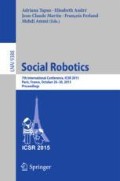Abstract
Before interacting with a futuristic technology such as a robot, there is a lot of space for the creation of a whole set of expectations towards that interaction. Once that interaction happens, users can be left with a hand full of satisfaction, dissatisfaction, or even a mix of both. To study the possible role of experience as a mediator between expectation and satisfaction, we developed a scale for HRI that measures expectations and satisfaction of the users. Afterwards, we conducted a study with end-users interacting with a social robot. The robot is being developed to be an empathic robotic tutor to be used in real schools, with input from primary end-users (children). Children’s expectations and subsequent satisfaction after the interaction with the robotic tutor were analysed. The results can be fed back to the system developers on how well it is being designed for such a target population, and what factors regarding their expectation and satisfaction have shifted after the experience of interaction. By delivering on the children’s expectations, we aim to design a robotic tutor that provides enough satisfaction to sustain an enjoyable and natural interaction in the real educational environment.
Preview
Unable to display preview. Download preview PDF.
References
Allen, M., Bourhis, J., Burrell, N., Mabry, E.: Comparing student satisfaction with distance education to traditional classrooms in higher education: A meta-analysis. The American Journal of Distance Education 16(2), 83–97 (2002)
Alves-Oliveira, P., Petisca, S., Janarthanam, S., Hastie, H., Paiva, A.: How do you imagine robots? Childrens’ expectations about robots. In: Workshop on Child-Robot Interaction at IDC14 - Interaction Design and Children (2014)
Bacon-Smith, C.: Science fiction culture. University of Pennsylvania Press (2000)
Bartneck, C., Forlizzi, J.: A design-centred framework for social human-robot interaction. In: 13th IEEE International Workshop on Robot and Human Interactive Communication, RO-MAN 2004, pp. 591–594 (2004)
Bhattacherjee, A.: Understanding Information Systems Continuance: An Expectation-Confirmation Model. MIS Quarterly 25(3), 351–370 (2001)
Bhattacherjee, A., Premkumar, G.: Understanding changes in belief and attitude toward information technology usage: a theoretical model and longitudinal test. MIS Quarterly 28(2), 229–254 (2004)
Castellano, G., Paiva, A., Kappas, A., Aylett, R., Hastie, H., Barendregt, W., Nabais, F., Bull, S.: Towards empathic virtual and robotic tutors. In: Lane, H.C., Yacef, K., Mostow, J., Pavlik, P. (eds.) AIED 2013. LNCS, vol. 7926, pp. 733–736. Springer, Heidelberg (2013)
Cortina, J.M.: What is coefficient alpha? An examination of theory and applications. Journal of Applied Psychology 78(1), 98 (1993)
Ekman, P., Friesen, W.: Measuring Facial Movement. Environmental Psychology and Nonverbal Behavior 1(1), 56–75 (1976)
Eom, S.B., Wen, H.J., Ashill, N.: The determinants of students’ perceived learning outcomes and satisfaction in university online education: An empirical investigation*. Decision Sciences Journal of Innovative Education 4(2), 215–235 (2006)
Fazio, R.H., Zanna, M.P.: Direct experience and attitude-behavior consistency. Advances in Experimental Social Psychology 14, 161–202 (1981)
Feil-Seifer, D., Matarić, M.J.: Defining socially assistive robotics. In: Rehabilitation Robotics. ICORR 2005, pp. 465–468. IEEE (2005)
Hunt, H.K.: CS/D - Overview and future research directions. Conceptualization and measurement of consumer satisfaction and dissatisfaction, pp. 455–488 (1977)
Oliver, R.L.: Measurement and evaluation of satisfaction processes in retail settings. Journal of Retailing (1981)
Oliver, R.: A congitive model of the antecedents and consequences of satisfaction decisions. Journal of Marketing Research, 460–469 (1980)
Paechter, M., Maier, B., Macher, D.: Students expectations of, and experiences in e-learning: Their relation to learning achievements and course satisfaction. Computers & Education 54(1), 222–229 (2010)
Pereira, A., Prada, R., Paiva, A.: Socially present board game opponents. In: Reidsma, D., Nijholt, A., Romão, T. (eds.) ACE 2012. LNCS, vol. 7624, pp. 101–116. Springer, Heidelberg (2012)
Ribeiro, T., Pereira, A., Di Tullio, E., Alves-Oliveira, P., Paiva, A.: From thalamus to skene: high-level behaviour planning and managing for mixed-reality characters. In: Intelligent Virtual Agents - Workshop on Architectures and Standards (2014)
Riek, L.D.: Wizard of Oz studies in HRI: a systematic review and new reporting guidelines. Journal of Human-Robot Interaction 1(1) (2012)
Sequeira, P., Melo, F.S., Paiva, A.: lets save resources!: A dynamic, collaborative AI for a multiplayer environmental awareness game
Wistort, R.: Only robots on the inside. Interactions 17(2), 72–74 (2010)
Author information
Authors and Affiliations
Corresponding author
Editor information
Editors and Affiliations
Rights and permissions
Copyright information
© 2015 Springer International Publishing Switzerland
About this paper
Cite this paper
Alves-Oliveira, P., Ribeiro, T., Petisca, S., di Tullio, E., Melo, F.S., Paiva, A. (2015). An Empathic Robotic Tutor for School Classrooms: Considering Expectation and Satisfaction of Children as End-Users. In: Tapus, A., André, E., Martin, JC., Ferland, F., Ammi, M. (eds) Social Robotics. ICSR 2015. Lecture Notes in Computer Science(), vol 9388. Springer, Cham. https://doi.org/10.1007/978-3-319-25554-5_3
Download citation
DOI: https://doi.org/10.1007/978-3-319-25554-5_3
Published:
Publisher Name: Springer, Cham
Print ISBN: 978-3-319-25553-8
Online ISBN: 978-3-319-25554-5
eBook Packages: Computer ScienceComputer Science (R0)

